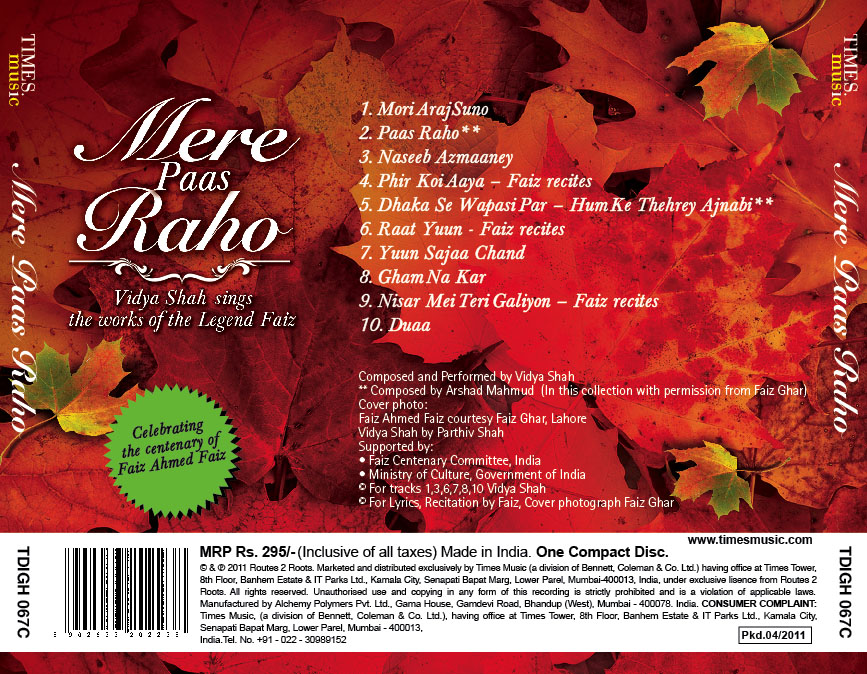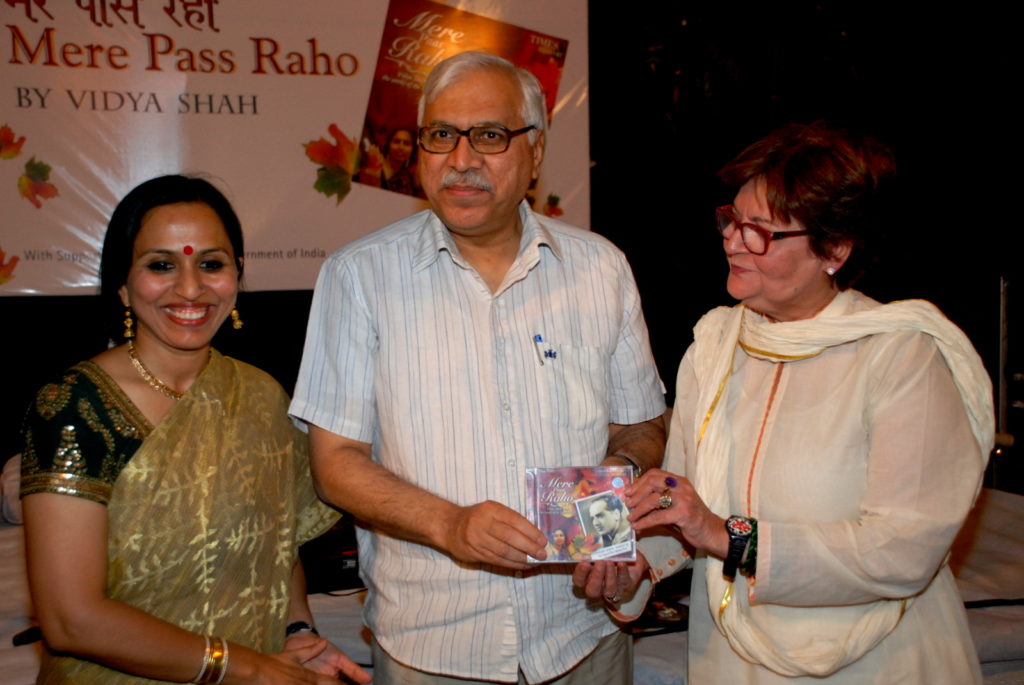Mere Paas Raho, an audio CD

As part of a centenary tribute to the poet Faiz Ahmed Faiz, CMAC produced an audio CD called Mere Paas Raho. The CD includes an array of songs composed and performed by Vidya Shah, based on the work of Faiz. Mere Paas Raho was produced in collaboration with the Faiz Ghar, which was set up by the poet’s daughters.
The album begins with Mori Araj Suno –a simple prayer drawing on the vocabulary of Braj Bhasa, a dialect of Hindi associated with the legend of the Hindu god, Krishna. Another number – Dhaka Se Wapasi Par – reflects on the breakaway of East Pakistan to become Bangladesh. The album is characterized by its original musical interpretation of Faiz’s poetry. The score incorporated western instruments to stress the contemporaneousness of Faiz’s work as well as the new syncretic influences at work in Indian music.
The CD Launch

Mere Pass Raho was launched by Shri S Y Qureshi, Chief Election Commissioner of India and Faiz Sahab’s daughter, Salima Hashmi with his grandson Ali Hashmi, at the Indian Women’s Press Corps (IWPC), in New Delhi. Many other well-known dignitaries such as Shri Mani Shankar Aiyer, MP, Rajya Sabha, Sayeda Hameed, Member, Planning Commission, Shri A.B.Bardhan, General Secretary, CPI, attended the launch.
The audio CD was brought out by Times Music, in collaboration with the Ministry of Culture, Government of India and the Faiz Centenary Committee.
After the launch of the CD, Vidya Shah performed selected works of Faiz for the audience.
Media Coverage
Rajyasabha TV: Discussion on Faiz
View CD Launch Event Pictures
Jashan-E-Faiz
After the success of the CD “Mere Paas Raho”, Vidya Shah was invited to perform at the Punjab Naatshala, Amritsar, Punjab, on the occasion of Faiz’s centenary celebrations.
Faiz Ghar
Vidya Shah was invited in February 2010 for an opening concert for Faiz’s centenary celebrations at Faiz Ghar, Lahore, Pakistan.
Vidya Shah remembers:
“Walking across the border is such a thrilling experience, even if it all involves ensuring that you are completely conscious of the physical act of it. This last mile is loaded, a palpable tension. But one look at the other end of this passage, where an elegant figure in the same Salwar Kameez that I am wearing, waves at you, all this melts into a muffled excitement. So close to entering Pakistan.
When Prof. Salima Hashmi and her sister Moneeza Hashmi mentioned to me sometime last year that they would like to explore with me the possibility of my performance at the FaizGhar as part of events to set off the Centenary celebrations for Faiz Saheb, at the cost of sounding maudlin, I have to say I was moved to tears. An appropriate irony, I should come across the border to sing in remembrance of a man who suffered these boundaries in life and in thought! This was really special, an invitation to share my music in a space set up in the memory of this remarkable wordsmith, one who continues to inspire many in my generation in his belief that peace, syncretism and equality should not become mere rhetoric.
On day one at the book launch of Shoaib Saheb’s translations Salima requested me to sing a short piece to lend to what was such a beautifully choreographed evening with readings and music and reminiscing. But day two belonged to me. I sang the traditional Khayal (in Basant since this was also special in Lahore just as it is in North India), Thumri, Dadra and some of Begum Akhtar, who Salima remembers listening to with her father. In this intimate space of a Baithak at the Faiz Ghar, I and even my Saazinda’s who had come with me from Delhi, felt rather emotional and warm about the overwhelming response that we received.
Ali Sardar Jaffrey concluded his powerful verse Isi Sarhad pe kal dooba thaa suraj ho ke do tukde with: Main is sarhad pe kabse muntazir hoon subhe-e farda ka (I stand on this borderwaiting for tomorrow’s happy dawn).”
Vidya Shah
About Vidya Shah
Vidya Shah is not just another prodigiously gifted singer, she is also an interpreter of texts and melodies. Vidya is endowed with an amazing tonal quality and lilting throw of voice. Her musical tayyari, her state of preparedness, is, by any reckoning, impeccable.
Trained for decades in both Karnatak and Hindustani classical music, her renditions of Faiz Ahmed Faiz’s poetry eloquently underline her willingness to create a mode of singing which is simultaneously reverential and, in a specific contemporary sense, daring. She engaged with the past through highly economic and nuanced quotations from such legendary singers as Begum Akhtar and Iqbal Bano. As for the contemporary edge, she achieves a state of liberation when she raises her voice almost as a compelling mystic call or pukaar. There is a lingering celebrative core to her work, which never fails to draw the listeners in.
About Faiz Ahmed Faiz (1910-2010)
Faiz Ahmad Faiz was one of the most prominent poets who won unparalleled global acclaim. He lived and worked in Pakistan, and was deeply connected to India.
Faiz’s poetry articulates the aspirations, anguish, pain and suffering of not only the people of Pakistan but that of the whole world. Furthermore, it portrays their unremitting resolve to create a better society. His was the voice of sanity, for he sought peace in a troubled world. Faiz lived in the times of literary giants like Josh Malihabadi, Sardar Jafri, Kaifi Azmi, Majaz Lakhnawi, Majrooh Sultanpuri, Pablo Neruda, Rasul Gamzatov, Ralph Russell and many others. Faiz was their equal, and can rightfully claim a place in this galaxy of world-renowned poets.